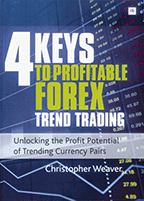 (180 pages, $39.99 paperback, 2012, ISBN 978-0857190895) by Christopher Weaver, published by Harriman House.
(180 pages, $39.99 paperback, 2012, ISBN 978-0857190895) by Christopher Weaver, published by Harriman House.BOOKS FOR TRADERS
 (180 pages, $39.99 paperback, 2012, ISBN 978-0857190895) by Christopher Weaver, published by Harriman House.
(180 pages, $39.99 paperback, 2012, ISBN 978-0857190895) by Christopher Weaver, published by Harriman House.
Trendlines, channels, Fibonacci retracements, and symmetrical triangles are the four keys to trading forex. This is an in-depth look at how every key works, and most important, two practical strategies for each that takes full advantage of their strengths. The concepts behind the keys are illustrated with charts and examples.
Additional information: www.Harriman-house.com
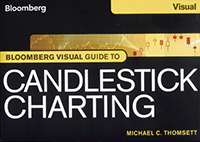 (374 pages, $60 paperback, 2012, ISBN 978-1-118-09845-5) by Michael C. Thomsett, published by Bloomberg Press, an imprint of Wiley.
(374 pages, $60 paperback, 2012, ISBN 978-1-118-09845-5) by Michael C. Thomsett, published by Bloomberg Press, an imprint of Wiley.
This book is designed for anyone who wants to know more about this way of visualizing price movements. It serves as a guide to the most frequently used charts. It is arranged in an easy-to-use manner, and provides a quick reference for those looking to learn more about candlestick charts as well as those entering the field for the first time. It features more than 200 candlestick and related terms in a way to make the concepts easier to understand.
Additional information: www.wiley.com/go/bloombergpress
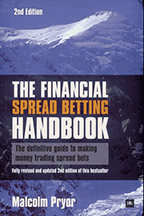 (288 pages, £24.99 paperback, 2011, ISBN 978-0857190857) by Malcolm Pryor, published by Harriman House.
(288 pages, £24.99 paperback, 2011, ISBN 978-0857190857) by Malcolm Pryor, published by Harriman House.
This work about financial spread betting includes getting set up with the right corporate data, charting and accounts software, deciding what to bet on and the time frame, learning how to operate and account, controlling risk, and learning from the mistakes of others. It covers strategies like trend-following, countertrend, and delta-neutral strategies like pair trading. Finally, it shows how winners separate themselves from losers with good trade planning, recordkeeping, risk management, psychology, and more.
Additional information: www.Harriman-house.com, www.spreadbettingcentral.co.uk
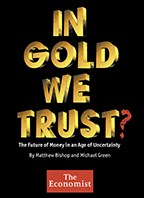 (106 pages, $2.99 Kindle Short, 2012, ISBN 978-0-9849362-1-2) by Matthew Bishop and Michael Green, published by The Economist Newspaper Ltd., available for Kindle.
(106 pages, $2.99 Kindle Short, 2012, ISBN 978-0-9849362-1-2) by Matthew Bishop and Michael Green, published by The Economist Newspaper Ltd., available for Kindle.
This is a quick read of the history of gold as money throughout history. It is a chronicle of the many booms and busts that have resulted as even the wisest of men attempted to put a value on the yellow metal in order to tie it to their countries’ currencies. The pros and cons of owning gold are given. Spoiler alert: No good answer is given to the title’s implied question beyond gold becoming part of a technology to fairly balance the value of money.
Additional information: www.economist.com, www.amazon.com
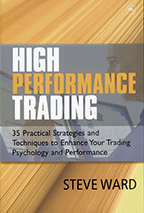 (293 pages, £39 paperback, 2009, ISBN 978-1905641611) by Steve Ward, published by Harriman House.
(293 pages, £39 paperback, 2009, ISBN 978-1905641611) by Steve Ward, published by Harriman House.
This book provides practical techniques and strategies to help traders of all abilities, experience, and styles to enhance their trading performance and psychology. It is based on coaching, experience, the latest research, and advice from leading traders and psychologists. It will help you avoid pitfalls in trading, strengthen your discipline, hone your mental edge, develop focus, build resilience to cope with trading stresses, and more.
Additional information: www.Harriman-house.com
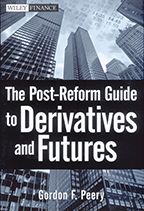 (362 pages, $95 hardcover, 2012, ISBN 978-0-470-55371-8) by Gordon F. Peery, published by John Wiley & Sons.
(362 pages, $95 hardcover, 2012, ISBN 978-0-470-55371-8) by Gordon F. Peery, published by John Wiley & Sons.
No aspect of our financial system evolves more dynamically than the derivatives market. This market is the largest and most powerful in the world; it is also the least understood. The need to understand derivatives has never been greater. This book explains what derivatives and futures are, who trades them, and how this trading will be transformed. It illustrates how high-profile failures compelled lawmakers to transform (but not too well so far) the OTC derivatives market into one that resembles the futures market. It shows how the crash of 2008 was not the fault of derivatives alone.
Additional information: www.wiley.com